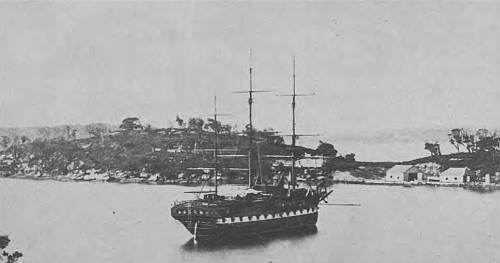- Author
- Cowburn, Professor P. M.
- Subjects
- None noted
- Tags
-
- RAN Ships
- None noted.
- Publication
- August 1972 edition of the Naval Historical Review (all rights reserved)
‘The arrival of a man-of-war was occasionally received by the savages with friendliness and the appearance of delight. When the captain landed, he was entertained with stories of the iniquitous conduct of the neighbours of his new acquaintances…. Soon he would discover that his ‘friends’ contemplated attacking their neighbours and hoped to secure the Navy’s aid.
The question then would be whether or not to give that aid, but often there was little chance of discussing the implications of any decision with anyone else. In fact there were usually only two methods of approach open: either the officer could demand to see the local chieftain and give him ‘a talking to’ – which might well be construed as weakness – or he might ‘convert him’, that is to say intimidate him, by an act of war. Bridge’s own experiences clearly made him sensitive about such matters even in recollection many years later. So often, he wrote, the actions of British naval officers in keeping the peace in the South Seas had been carried out ‘in the cold shade of Foreign Office dullness, not of the Secretaries of State themselves, but of their under-strappers’, so that the ‘bureaucratic solidity’ of clerks and the ‘smug self-satisfaction of second-rate men’ provided the greatest frustrations.

To take another point, Bridge’s attitude towards the missionaries was scrupulously fair. He did not really approve of their work amongst the islanders himself, but he thought that no fair-minded man could refuse to admit that they had ‘conferred great benefits on their converts, and not on their converts alone’. Again, he conceded that missionaries ‘encouraged decently disposed white men to continue to behave decently’, and he rallied to their defence against the charge that they competed unfairly with the traders. Bridge was also impressed by the quality of men such as Robertson of Eromanga, doggedly carrying on his work there, though his two immediate predecessors had been murdered, or Wilson, a county cricketer in his younger days, or Moulton, that painstaking scholar in charge of the Wesleyan Mission in Nukualofa, who translated much of the Bible into Tongan and even produced a blank verse rendering of Paradise Lost in the same language.
If the amount of space given to Gowlland and Bridge in this short essay seems overgenerous, their virtues as writers of straightforward narrative and accurate observers can be cited in justification. Other examples might have been selected, and high amongst them should be placed Commodore James Goodenough. Though the printed version of his journal has been severely pruned so that all political references to his part in the annexation of Fiji have vanished, the manuscript volumes show throughout the observations of an intelligent and wellread man, deeply interested in local flora and fauna as well as in native customs and languages.
Commander George Palmer and Captain Albert Markham successively commanded the wooden sloop Rosario in the early 1870s and both officers wrote books soon after their commands ended to expose ‘the almost unheard of enormities’, to use Markham’s phrase, committed by those engaged in the island labour trade. Their books thus had a distinct purpose and their ‘political’ nature stirred up no little controversy, but this does not detract from their merits as more than competent examples of the literary genre we have been considering. John Moresby, who, like Markham, was to reach flag-rank, also wrote his New Guinea and Polynesia with a political purpose, but it and his combined study of his father’s and his own naval careers have many of the qualities that characterise the best naval writing. The list might be extended further to include less well-known personalities, but it is hoped that enough has been said to attract readers to the study of this rewarding branch of literature.




